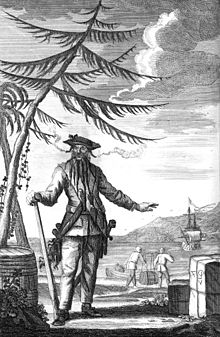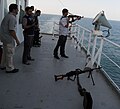Portal:Piracy
Introduction
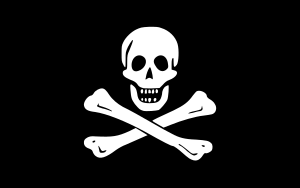
Piracy is an act of robbery or criminal violence by ship or boat-borne attackers upon another ship or a coastal area, typically with the goal of stealing cargo and other valuable goods. Those who conduct acts of piracy are called pirates, and vessels used for piracy are called pirate ships. The earliest documented instances of piracy were in the 14th century BC, when the Sea Peoples, a group of ocean raiders, attacked the ships of the Aegean and Mediterranean civilisations. Narrow channels which funnel shipping into predictable routes have long created opportunities for piracy, as well as for privateering and commerce raiding.
Historic examples of such areas include the waters of Gibraltar, the Strait of Malacca, Madagascar, the Gulf of Aden, and the English Channel, whose geographic structures facilitated pirate attacks. The term piracy generally refers to maritime piracy, although the term has been generalized to refer to acts committed on land, in the air, on computer networks, and (in science fiction) outer space. Piracy usually excludes crimes committed by the perpetrator on their own vessel (e.g. theft), as well as privateering, which implies authorization by a state government.
Piracy or pirating is the name of a specific crime under customary international law and also the name of a number of crimes under the municipal law of a number of states. In the 21st century, seaborne piracy against transport vessels remains a significant issue, with estimated worldwide losses of US$25 billion in 2023, increased from US$16 billion in 2004. (Full article...)
Selected biography -
Edward Teach (or Thatch; c. 1680 – 22 November 1718), better known as Blackbeard, was an English pirate who operated around the West Indies and the eastern coast of Britain's North American colonies. Little is known about his early life, but he may have been a sailor on privateer ships during Queen Anne's War before he settled on the Bahamian island of New Providence, a base for Captain Benjamin Hornigold, whose crew Teach joined around 1716. Hornigold placed him in command of a sloop that he had captured, and the two engaged in numerous acts of piracy. Their numbers were boosted by the addition to their fleet of two more ships, one of which was commanded by Stede Bonnet, but Hornigold retired from piracy toward the end of 1717, taking two vessels with him.
Teach captured a French slave ship known as La Concorde, renamed her Queen Anne's Revenge, equipped her with 40 guns, and crewed her with over 300 men. He became a renowned pirate. His nickname derived from his thick black beard and fearsome appearance. He was reported to have tied lit fuses (slow matches) under his hat to frighten his enemies. He formed an alliance of pirates and blockaded the port of Charles Town, South Carolina, ransoming the port's inhabitants. He then ran Queen Anne's Revenge aground on a sandbar near Beaufort, North Carolina. He parted company with Stede Bonnet and settled in Bath, North Carolina, also known as Bath Town, where he accepted a royal pardon. However, he was soon back at sea, where he attracted the attention of Alexander Spotswood, the governor of Virginia. Spotswood arranged for a party of soldiers and sailors to capture him. On 22 November 1718, following a ferocious battle, Teach and several of his crew were killed by a small force of sailors led by Lieutenant Robert Maynard. (Full article...)
Selected article -
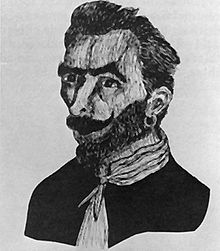
José Gaspar, also known by his nickname Gasparilla (supposedly lived c. 1756 – 1821), is a mythical Spanish pirate who supposedly terrorized the Gulf of Mexico from his base in southwest Florida during Florida's second Spanish period (1783 to 1821). Though details about his early life, motivations, and piratical exploits differ in various tellings, they agree that the 'Last of the Buccaneers" was a remarkably active pirate who amassed a huge fortune by taking many prizes and ransoming many hostages during his long career and that he died by leaping from his ship rather than face capture by the U.S. Navy, leaving behind his still-hidden treasure.
While Gaspar is a popular figure in Florida folklore, there is no evidence that he existed. No contemporary mention of his life or exploits has been found in Spanish or American ship logs, court records, newspapers, or other archives, and no physical artifacts linked to Gaspar have been discovered in the area where he supposedly established his "pirate kingdom." The earliest known written mention of José Gaspar was a short biography included in an early 1900s promotional brochure for the Gasparilla Inn on Gasparilla Island at Charlotte Harbor, the author of which freely admitted that the dramatic tale was a work of fiction "without a true fact in it". Subsequent retellings of the Gaspar legend are based upon this fanciful account, including the accidental inclusion of José Gaspar in a 1923 book on real pirates that has caused ongoing confusion about his historical authenticity. (Full article...)
Did you know?
- ... that Black Sheep Radio dedicated its first day of programming to a fallen pirate?
- ... that the developers of Hotline Miami 2: Wrong Number suggested that Australian customers pirate their game?
- ... that indigenous Australian artist Daniel Boyd has depicted colonial figures including Captain James Cook and Governor Arthur Phillip as pirates?
- ... that Saudi Arabian broadcaster beoutQ pirated and resold beIN Sports programmes during the Qatar diplomatic crisis?
- ... that HMS Redpole, one of the aptly-named coffin brigs, sank in an action with a pirate vessel in August 1828?
- ... that since 1904 the Gasparilla Pirate Festival in Tampa, Florida, has featured a pirate-themed parade?
- ... that there is only one account of walking the plank?
- ... that English pirate Henry Every, who was sometimes known as Long Ben, was one of the few major pirate captains to retire with his loot without being arrested or killed in battle?
- ... that, unlike traditional Western societies of the time, many pirate clans operated as limited democracies, demanding the right to elect and replace their leaders?
Selected quotations
| “ | Come, let us make a hell of our own, and try how long we can bear it. | ” |
| — Blackbeard | ||
General images
Selected Jolly Roger
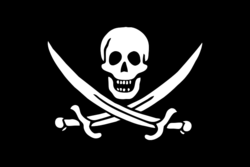
Subcategories
Topics
WikiProjects
Related portals
Things you can do

Contribute
- Work on piracy and pirate articles and help improve them to featured articles.
Expand
Join
WikiProject Piracy Requests
- eliminate red links from List of pirates
- expand Timeline of piracy, specifically to fill in vast gap between the 1890s to 2000s
- revise Bartholomew Roberts
- help with Requested articles and Expand articles
- help with Portal:Piracy
Associated Wikimedia
The following Wikimedia Foundation sister projects provide more on this subject:
-
Commons
Free media repository -
Wikibooks
Free textbooks and manuals -
Wikidata
Free knowledge base -
Wikinews
Free-content news -
Wikiquote
Collection of quotations -
Wikisource
Free-content library -
Wikiversity
Free learning tools -
Wiktionary
Dictionary and thesaurus

